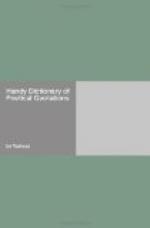And but for these vile guns,
He would himself have been a soldier.
1755
SHAKS.: 1 Henry IV., Act i., Sc. 3.
The broken soldier, kindly bade to stay, Sat by his fire, and talk’d the night away; Wept o’er his wounds, or, tales of sorrow done, Shoulder’d his crutch, and show’d how fields were won. 1756 GOLDSMITH: Des. Village, Line 155.
How shall we rank thee upon glory’s page, Thou more than soldier, and just less than sage? 1757 MOORE: To Thomas Hume.
=Solitude.=
Solitude sometimes is best society,
And short retirement urges sweet return.
1758
MILTON: Par. Lost, Bk. ix., Line
249.
O solitude! where are the charms
That sages have seen in thy face?
Better dwell in the midst of alarms,
Than reign in this horrible place.
1759
COWPER: Verses supposed to be written by Alex.
Selkirk, St. 1.
Man dwells apart, though not alone,
He walks among his peers unread;
The best of thoughts which he hath known,
For lack of listeners are not said.
1760
JEAN INGELOW: Afternoon at a Parsonage, Afterthought.
It was a wild and lonely ride.
Save the hid loon’s mocking cry,
Or marmot on the mountain side,
The earth was silent as the sky.
1761
HAMLIN GARLAND: The Long Trail.
=Son.=
Thence to be wrench’d with an unlineal hand,
No son of mine succeeding.
1762
SHAKS.: Macbeth, Act iii., Sc. 1.
The booby father craves a booby son, And by Heaven’s blessing thinks himself undone. 1763 YOUNG: Love of Fame, Satire ii., Line 165.
=Song.=
And heaven had wanted one immortal song. 1764 DRYDEN: Absalom and Achitophel, Pt. i., Line 197.
That not in fancy’s maze he wander’d long, But stoop’d to truth, and moraliz’d his song. 1765 POPE: Prologue to the Satires, Line 340.
For dear to gods and men is sacred song.
Self-taught I sing; by Heaven, and Heaven alone,
The genuine seeds of poesy are sown.
1766
POPE: Odyssey, Bk. xxii., Line 382.
=Sonnet.=
Scorn not the sonnet. Critic, you have frowned,
Mindless of its just honors; with this key
Shakespeare unlocked his heart.
1767
WORDSWORTH: Scorn not the Sonnet.
=Sorrow.=
Give sorrow words: the grief that does not speak Whispers the o’erfraught heart, and bids it break. 1768 SHAKS.: Macbeth, Act iv., Sc. 3.
One sorrow never comes, but brings an heir, That may succeed as his inheritor. 1769 SHAKS.: Pericles, Act i., Sc. 4.
Nothing comes to us too soon but sorrow. 1770 BAILEY: Festus, Sc. Home.
This is truth the poet sings, That a sorrow’s crown of sorrow is remembering happier things. 1771 TENNYSON: Locksley Hall, St. 38.




